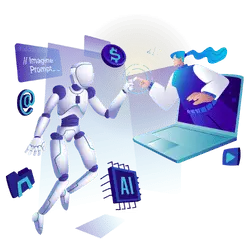Artificial Intelligence (AI) has been a major part of our current reality. It is changing sectors and changing the job field. Since AI is growing with a speed that is exponential and is a necessity that experts stay up-to-date about new roles which will determine the future of the workplace. We will look at four AI jobs which are expected to have a major role in the near future.

1. AI Ethicist
In the recent years, as we see more and more incorporation of AI throughout our lives, the requirement for ethical and responsible AI development has risen substantially. AI ethicists serve as the ones who are responsible for this making sure that AI techniques are created to be developed, tested, and implemented with respect to ethical principles as well as considering social impact.
Responsibilities:
- Check AI methods for bias.
- Create ethical frameworks.
- Advise businesses on responsible AI practices.
- Participate in discussions with the public about AI ethics.
Skills:
- A solid understanding of moral principles.
- The understanding AI technology. AI technology.
- Good communication skills and analytical talent.
- A background in philosophy, law or the social sciences.
2. AI Trainer or AI Engineer
AI algorithms, similar to humans, require ongoing training to rise their inference. AI engineers are accountable of continuously educating AI models by providing relevant information and guidelines in order to assure the continuous advancement of their models.
Responsibilities:
- ready and label data sets.
- Create training guidelines.
- Always monitor and assess the model’s performance.
- Modify algorithms for better precision of the model.
Skills:
- Experience in machine learning and deep learning methods.
- Expertise in data analysis.
- The programming knowledge (Python, R).
- Experience with AI tools and techniques.
3. AI Interaction Designer
As AI-powered devices and applications growing in use that the requirement for an intuitive and seamless human-computer interaction has risen. AI interaction experts help bridge the gaps in AI technology and human-computer interaction with user-friendly interactions and user experiences.
Responsibilities:
- Develop conversational interfaces to chatbots as well as digital assistants.
- Create frontends that are geared towards the consumer for AI products.
- Perform A/B tests to better understand the preferences and needs of users.
Skills:
- Experience in the field of the user interface (UI) as well as the user experience (UX) concepts of design.
- Human-computer interaction.
- The understanding of AI abilities and weaknesses.
- Communication and collaboration knowledge.
4. AI Safety Engineer
Securing the security and safety of AI technology is of paramount significance. AI Safety engineers are accountable in ensuring that AI devices function properly and without risk.
Responsibilities:
- Do risk assessments on AI system.
- Create safety procedures as well as mitigation methods.
- Install security measures to safeguard AI system from cyber attacks.
- Be informed of the most recent studies on AI security.
Skills:
- A solid understanding of concepts in cybersecurity.
- Experience with AI algorithms and architectural concepts.
- Experiential experience with the testing of cybersecurity and vulnerability.
- Analytical and problem-solving abilities.
Conclusion
As AI is evolving as it does, the responsibilities of AI ethicsists, AI trainer/engineer, AI interaction designer, as well as AI safety engineer will be more important. These jobs are not just required to warrant the growth of AI technologies, but also their secure and responsible incorporation into our everyday life. Being aware of these new jobs and learning the required knowledge is crucial for anyone looking to excel in an AI-driven world.
FAQs
- The role of an AI ethicist so important? AI ethicists assure that AI technologies are created and used in a way which is ethical and also considers the impact on society while avoiding misuse and bias.
- Which knowledge are required to be the job of an AI teacher and AI engineer?
Essential knowledge include knowledge in deep and machine methods for learning, knowledge of data analysis and programming skills (Python, R), as well as experience with AI technology and tools. - How do AI interaction designers improve user experiences?
AI interaction designers develop friendly user interfaces and experiences through creating conversational interfaces, constructing user-centric frontends and A/B tests to discover the preferences of users. - What exactly are the duties that the AI security engineer?
They are responsible for performing assessments of the risks associated with AI systems, establishing safety guidelines, implementing security functions, and remaining up-to-date on the most recent AI safety studies. - What can we do to be prepared for the possibility of a job in the upcoming AI positions?
The preparation process involves learning relevant knowledge through training and education and staying up-to-date with most recent advancements in AI and learning via collaborative projects and practical work


